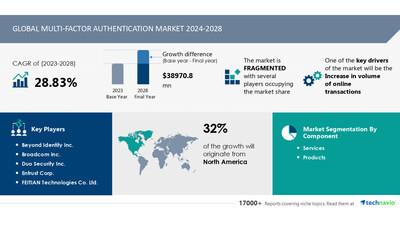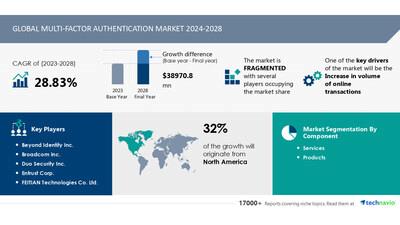
Multi-Factor Authentication Market Size Is Set To Grow By USD 38.97 Billion From 2024-2028, Increase In Volume Of Online Transactions Boost The Market, Technavio
| Multi-Factor Authentication Market Scope |
|
| Report Coverage |
Details |
| Base year |
2023 |
| Historic period |
2018 - 2022 |
| Forecast period |
2024-2028 |
| Growth momentum & CAGR |
Accelerate at a CAGR of 28.83% |
| Market growth 2024-2028 |
USD 38970.8 million |
| Market structure |
Fragmented |
| YoY growth 2022-2023 (%) |
22.45 |
| Regional analysis |
North America, Europe, APAC, South America, and Middle East and Africa |
| Performing market contribution |
North America at 32% |
| Key countries |
US, China, Germany, UK, and Japan |
| Key companies profiled |
Beyond Identity Inc., Broadcom Inc., Duo Security Inc., Entrust Corp., FEITIAN Technologies Co. Ltd., Frontegg, Fujitsu Ltd., FusionAuth, Giesecke Devrient GmbH, HID Global Corp., Microsoft Corp., NEC Corp., Okta Inc., OneSpan Inc., Quest Software Inc., RSA Security LLC, SecureAuth Corp., Thales Group, TransUnion, and Yubico AB |
Market Driver
Out-of-Band (OOB) authentication is a multi-factor security solution that enhances user identity verification and protects against unauthorized access. OOB technology works by utilizing a separate communication channel for authentication requests, ensuring high-level security. Enterprises are increasingly adopting OOB for high-risk transactions, as it requires the presence of two different networks to be compromised for unauthorized access. Two common OOB authentication methods include hardware tokens and mobile phone-based authentication. Hardware tokens generate one-time passwords (OTPs) that users enter to gain access, while mobile phone-based authentication uses SMS or voice calls to send OTPs. Both methods offer a cost-effective alternative to complex biometric technologies. OOB authentication provides several advantages over traditional authentication methods. It eliminates the need for middleware, reducing costs, and offers a more secure three-level authorization process when combined with biometrics. Additionally, it supports mobile phone authentication for corporate networks and offers an open architecture platform for third-party solution integration. OOB technology also extends access to corporate logins using iris technology or telephone authentication and provides terminal authentication for terminals with common passwords. Furthermore, it supports VPN access, enabling biometric security for private networks, driving the growth of the multi-factor authentication market.
The Multi-Factor Authentication (MFA) market is experiencing significant growth due to increasing cyber threats in business environments. Cloud-based MFA solutions are becoming popular as they offer flexibility and ease of use. Security measures like MFA help protect data in the IoT environment and on-premises data from unauthorized access. Cybercriminals use various tactics such as malware, phishing, spoofing, ransomware, and APT attacks to gain access to sensitive information. MFA solutions provide an additional layer of security by requiring users to provide multiple forms of authentication, such as biometric data or authorized devices. However, the lack of awareness and inconvenience associated with MFA implementation can be a challenge for some businesses. The FTC Safeguards Rule and regulatory compliances are driving IT spending on MFA solutions. The market potential for MFA solutions is high due to the increasing number of interconnected devices and the vulnerability of password-based authentication. Response time is a critical factor in MFA, as breaches can result in significant damage to data integrity and customer trust. MFA solutions can help mitigate risks from zero-day threats and cyber adversaries, making them essential for enterprises protecting cloud data.
Discover 360° analysis of this market. For complete information, schedule your consultation -
Book Here!
Market
Challenges
-
The Multi-Factor Authentication (MFA) market is experiencing high costs due to the initial deployment and replacement of One-Time Password (OTP) tokens. These costs consist of the upfront pricing and licensing fees, infrastructure and hardware necessities, token warranties, and the resources required for implementation and management. The limited vendor presence in regions like South America and Eastern Europe, with key players being Entrust, RSA Security, and VASCO from the US and Europe, contributes to this issue. With a small pool of vendors dominating the market, the absence of significant competition leads to these elevated costs. Consequently, the increasing expense of OTP tokens may hinder the expansion of the MFA market during the forecast period.
The Multi-Factor Authentication (MFA) market is growing rapidly due to the increasing threat of cyber attacks. However, businesses face challenges in maintaining and managing MFA systems in heterogeneous IT environments. SMS gateways and physical authenticators require ongoing support, while ensuring interoperability between different technologies can be complex. Two-factor and even four-factor authentication are essential for securing online transactions in industry verticals like technology firms, e-commerce, and finance. Cybercriminals target customer accounts and personal information, leading to payment fraud and identity theft. Scanning technology and mobile authentication services, including biometric technologies, offer solutions. Utilities, manufacturing, logistics, and other sectors also require MFA for regulatory compliance. CA Technologies and other authentication product providers offer security against breaches, but capital investment and implementation complexity can be high. Overall, widespread adoption of MFA is crucial to protect against cyber threats.
For more insights on driver and challenges
-
Request a
sample report!
Segment Overview
This multi-factor authentication market report extensively covers market segmentation by
Component-
1.1 Services
1.2 Products
-
2.1 On-premises
2.2 Cloud
-
3.1 North America
3.2 Europe
3.3 APAC
3.4 South America
3.5 Middle East and Africa
1.1 Services- The Multi-Factor Authentication (MFA) market is growing as businesses prioritize security. MFA adds an extra layer of protection by requiring users to provide two or more verification factors to access accounts. This includes something they know, like a password, and something they have, like a mobile device. Major industries, including finance and healthcare, are adopting MFA to secure sensitive data. MFA reduces the risk of unauthorized access and enhances overall security. Companies implementing MFA can protect their reputation and maintain customer trust.
For more information on market segmentation with geographical analysis including forecast (2024-2028) and historic data (2017-2021) - Download a Sample Report
Learn and explore more about Technavio's in-depth research reports
The global Identity and Access Management (IAM) market is rapidly evolving, driven by increasing cybersecurity threats and regulatory requirements. Key drivers include the need for enhanced security measures and efficient user management in organizations. Major players like IBM, Microsoft, and Oracle are leading the charge, offering innovative IAM solutions. The market's expansion reflects growing investments in technology to safeguard digital identities and streamline access management.
Research Analysis
The Multi-Factor Authentication (MFA) Market is experiencing significant growth due to the increasing number of cyber threats and the need for enhanced security measures in business environments. Cloud-based MFA solutions are becoming increasingly popular as they offer greater flexibility and scalability. In the IoT environment, MFA plays a crucial role in securing interconnected devices and protecting data integrity. Biometric data, such as fingerprints or facial recognition, are common authentication models used in MFA. However, the lack of awareness and the vulnerability of passwords remain significant challenges. The market potential for MFA is vast, with drivers including the increasing use of smart thermostats, industrial sensors, and other IoT devices. Cyber threats, such as Advanced Persistent Threats (APT) and zero-day threats, continue to pose a significant risk to on-premises data and cloud security. MFA helps improve security posture by requiring users to provide additional forms of authentication beyond a password and an authorized device, thereby enhancing customer trust.
Market Research Overview
The Multi-Factor Authentication (MFA) Market is experiencing significant growth due to the increasing number of cyber threats in business environments, particularly in the cloud and IoT sectors. MFA solutions provide an additional layer of security by requiring users to provide multiple forms of identification before accessing sensitive data or systems. This includes biometric data, authorized devices, or one-time codes sent via SMS or email. In the IoT environment, interconnected devices and vulnerabilities pose a significant risk, making MFA essential for data protection. Cybercriminals use various tactics, such as malware, phishing, spoofing, ransomware, and APT attacks, to gain unauthorized access and cause breaches. The market potential for MFA solutions is vast, driven by regulatory compliances, higher-order authentication models, and the need for stronger security postures. However, challenges such as implementation complexities, cost, and inconvenience can hinder adoption. MFA solutions come in various forms, including cloud-based and on-premises, two-factor and four-factor authentication, and authentication-as-a-service. Industry verticals such as technology firms, service providers, and financial institutions are major adopters of MFA due to the sensitivity of their data and the potential for payment fraud and identity theft. Despite the benefits, the lack of awareness and IT spending on cybersecurity can limit the adoption of MFA solutions. Additionally, response time and interoperability are critical factors for enterprises managing heterogeneous IT environments. Overall, MFA is a crucial component of data security in the digital age, with the potential to protect against a range of cyber threats, from password attacks to zero-day threats.
Table of Contents:
1 Executive Summary
2 Market Landscape
3 Market Sizing
4 Historic Market Size
5 Five Forces Analysis
6 Market Segmentation
-
Component
-
Services
Products
-
On-premises
Cloud
-
North America
Europe
APAC
South America
Middle East And Africa
7 Customer Landscape
8 Geographic Landscape
9 Drivers, Challenges, and Trends
10 Company Landscape
11 Company Analysis
12 Appendix
About Technavio
Technavio is a leading global technology research and advisory company. Their research and analysis focuses on emerging market trends and provides actionable insights to help businesses identify market opportunities and develop effective strategies to optimize their market positions.
With over 500 specialized analysts, Technavio's report library consists of more than 17,000 reports and counting, covering 800 technologies, spanning across 50 countries. Their client base consists of enterprises of all sizes, including more than 100 Fortune 500 companies. This growing client base relies on Technavio's comprehensive coverage, extensive research, and actionable market insights to identify opportunities in existing and potential markets and assess their competitive positions within changing market scenarios.
Contacts
Technavio Research
Jesse Maida
Media & Marketing Executive
US: +1 844 364 1100
UK: +44 203 893 3200
Email:
[email protected]
Website:
SOURCE Technavio

Legal Disclaimer:
MENAFN provides the
information “as is” without warranty of any kind. We do not accept
any responsibility or liability for the accuracy, content, images,
videos, licenses, completeness, legality, or reliability of the information
contained in this article. If you have any complaints or copyright
issues related to this article, kindly contact the provider above.



















Comments
No comment